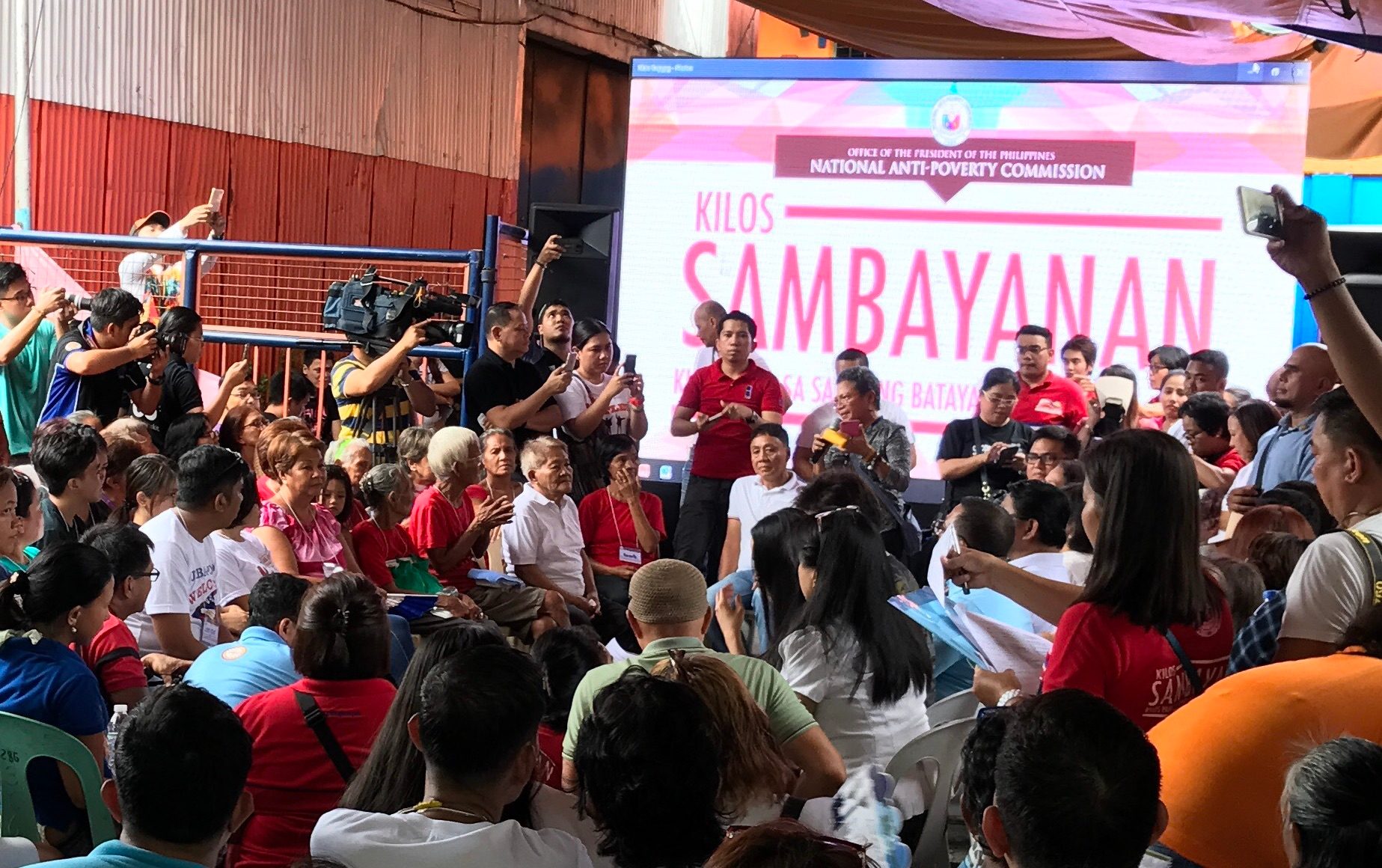SUMMARY
This is AI generated summarization, which may have errors. For context, always refer to the full article.

MANILA, Philippines – Members of the Cabinet’s Human Development and Poverty Reduction (HDPR) cluster on Sunday, July 16, launched a series of information and assistance drives for the poor communities.
The drive will focus on one of the following key areas of human development: social protection (including education and health), shelter, peace and people’s participation, and labor and employment.
The information caravan coincided with the National Anti-Poverty Commission’s (NAPC) launch of its anti-poverty policy agenda called Kilos para sa Sampung Batayang Pangangailangan (Kilos Sambayanan).
NAPC Secretary Liza Maza said it is a call for convergence of different agencies and sectors in addressing poverty at all fronts.
“Ang kahirapan ay hindi lamang kakulangan sa kita. Ang kahirapan ay ang hindi pagkamit ng isang tao ang mga bagay na bumubuo sa maayos na pamumuhay,” she said.
(Poverty is not only the lack of sufficient income. Poverty is also the failure to achieve the things needed for a decent life.)
In the first such event, held in Tondo, Manila on Sunday, Cabinet members conducted a forum with the community to discuss the projects of the government. Booths were also set up to assist them in accessing government programs.
The activity was organized by agencies such as the Department of Social Welfare and Development (DSWD), Department of Health (DOH), Department of Interior and Local Government (DILG), Department of Labor and Employment (DOLE), Department of Education (DepEd), Department of Agrarian Reform (DAR), the NAPC, housing agencies, and other national government bureaus.
Social Welfare Assistant Secretary Aleli Bawagan said 4 more similar events will be conducted in various parts of Metro Manila.
“The 10 agencies were divided to spread their message to the people into 4 [forums],” Bawagan said in an interview during Sunday morning’s event.
“The next event will be in August at the Commonwealth Elementary School… services will be done by the agencies. They will have their information caravan,” she added.
While the scheduled drives are all within Metro Manila, Maza encouraged the public to request for similar activities in their regions.
“Pwede po kayong magrequest sa action center. Pwede rin po sa NAPC at dun sa mga ahensya sa ilalim ng HDPR cluster… pwede po kayo magrequest sa mayor niyo. Iyong mayor niyo, pwedeng lumapit sa amin,” she said.
(You can request in local action centers. You can also get in touch with NAPC and any of the agencies under the HDPR cluster. You can also request through your mayor, who can then approach us.)
10 basic needs
NAPC has identified the 10 basic needs of the Filipinos: food, land reform, water, shelter, work, national industrialization, healthcare, education, social protection, healthy environment, peace and people participation.
Each government office mandated to address these concerns have been tasked to come up with their own commitments.
In its briefer, NAPC cited the following statistics affecting the human development of poor Filipinos:
- 1.3 million families have insufficient income
- 18.2% of the workers are precariously employed or have no job security
- 1.29 million families have no decent homes
- 93% of Filipinos are covered by the National Health Insurance Program but 55% of medication are still paid out of the patient’s pockets
- There is only one public doctor for every 33,000 Filipinos
- Only 20.7% of youth aged 16-24 have entered college
- 3 million families do not have access to clean water
- 1.3 million families do not have access to a proper bathroom
Data from the Philippine Statistics Authority in 2016 recorded that there are at least 20 million poor Filipinos.
A policy brief by the Philippine Institute of Development Studies (PIDS) said that 8 in 10 poor households are vulnerable.
PIDS also noted that 4 in 10 Filipino households have remained poor or slipped into poverty once in a period of 3 years, mostly due to unexpected shocks like disaster. – Rappler.com
Add a comment
How does this make you feel?
There are no comments yet. Add your comment to start the conversation.